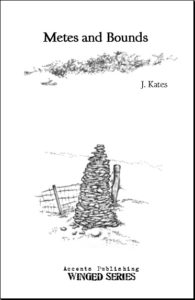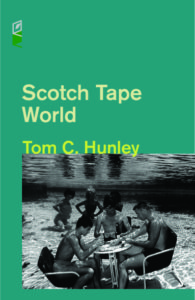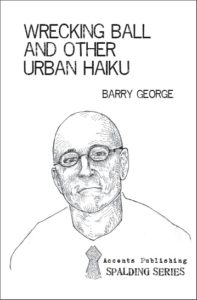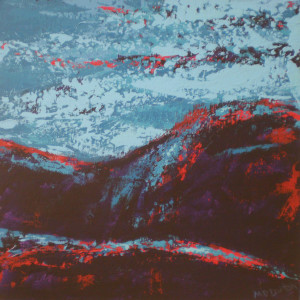Poet Lynnell Edwards answers a few questions about Kings of the Rock and Roll Hot Shop (Accents Publishing, 2014)
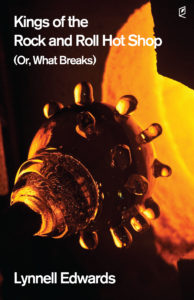
Tell us the story of your Accents Publishing book.
I was teaching an ekphrastic community workshop for Louisville Literary Arts and we visited Flame Run studio where I had made a contact with the owner/artist Brook White. I wrote a short poem myself (below) during the workshop, and I was so taken by the process that I decided to ask him if I could install myself as a kind of poet-in-residence during that summer of 2010. I hoped to just watch and ask questions and write and see what happened. It was an exhilarating project that resulted in a chapbook-length manuscript which I kind of sat on for a while because I knew that my third full length book for Red Hen, Covet, was due out in the fall of 2011 and I didn’t want to crowd that publication release. There were a few of the poems published, so I had the sense that it was good work that would appeal to a wider audience even though the subject was a little bit technical and obscure (which is why there are some end notes explaining vocabulary). In fall 2013, I began the conversation with Accents about this manuscript and was delighted they were interested in the project! We had a really fun launch for the book at Flame Run after its release in June 2014 and the book got some nice coverage in the Courier-Journal.
Do you still like it? Why or why not?
I loooove this book. I love chapbooks generally, but I am really happy with the way I experimented in the book (there are a couple of shaped poems) and the liberating effect of having all kinds of new vocabulary from glass blowing at my disposal.
What is the highest praise you’ve received for it?
People have enjoyed this book and informally told me how intriguing and energy-filled it is. But perhaps the highest praise has come from Brook’s own endorsement of it and his sharing of the book among his friends, family, and the shop.
What didn’t make it in the book?
I think there were probably a couple of poems that I started but never really finished and I honestly can’t remember what they were. But there was one longer piece that I really worked on and wanted to make fit but didn’t which was about another glass blowing team that came in after hours to work – Brooke had invited them to use his studio. It was fascinating to watch them – in part because there was a whole different vibe – but strangely, I couldn’t make the poem quite cohere and it seemed out of step with the other poems. At that point, then, I realized that the poems I had been writing and the book they would become was as much about the spirit and work of a particular studio and its particular personalities as it was about glass blowing generally.
Is there a poem from the book you’d like to share with the readers of the Accents blog?
This is the first poem I wrote, after my initial visit to the studio, and it ended up as the final poem of the book:
“Heart of Glass”
Feel its pulse and flare still —
beat of primitive fire, memory
of the molten womb from which
you drew it glowing and gave it
shaping breath: never
cold, never still.
How did you arrive at the title?
“Kings of the Rock and Roll Hot Shop” came to me really early on and there were no other competing or working titles. Simply put, the glass blowing crew played loud rock music all the while they were working and there was such confidence and verve in what they were doing that it seemed obvious to me that this was a rock and roll hot shop.
Do you have a favorite Accents Publishing book (other than yours) and if so, which one?
I selected E.K. Mortenson’s The Fifteenth Station for the 2012 chapbook prize and I still think it’s a remarkable sequence imagining, with a nod toward the biblical, the “least of us” and the struggle in dark places we in the first world too often turn from. I also really like Sarah Freligh’s A Brief Natural History of an American Girl – an inventive and clear-eyed memoir in poems that startles and delights.
What would you like to see Accents do going forward?
Keep publishing awesome books, for one! The new projects – the journal, the workshop series – all of these things help to nurture writers and readers and I am excited to see them succeed. I’m interested in the ways in which fine art and writing mutually resonate and it would be interesting to see some manuscript collaborations among poets, printmakers, and other artists.
What are you working on now?
I have another chapbook length manuscript titled This Great Green Valley that will be published by Broadstone Books in the late spring of this year. It consists of poems I wrote during a sabbatical in 2018 and is based on my research at the Filson Historical Society into the pre-statehood history of Kentucky, along with a long poem about my own childhood on the Kentucky River. Red Hen has a full-length manuscript from me tentatively titled The Bearable Slant of Light that will likely be released in late 2021; it explores the explores the effects of mental illness on the family and is much more experimental in many ways. Very different from my last book with them, Covet.
Share a poem, or at least a sentence from your new writing.
This is the very last stanza from a very, very new poem titled: “Carpool, with boys”
“Remember where we were going and how
we couldn’t wait to get there: the impossibly
green fields, the bright lines of play, the whistle
to begin high and bright as birds lifting in flight.”
